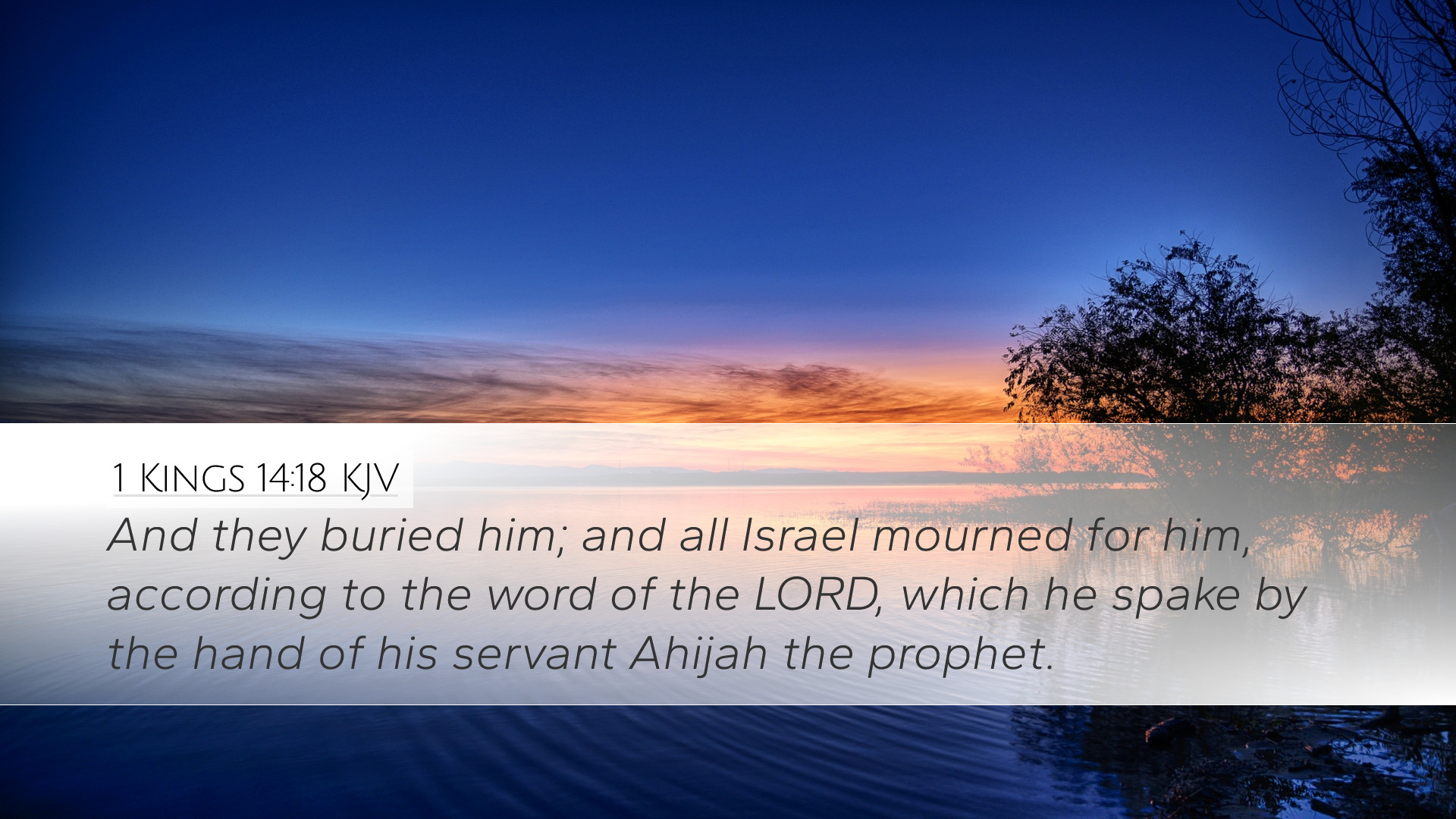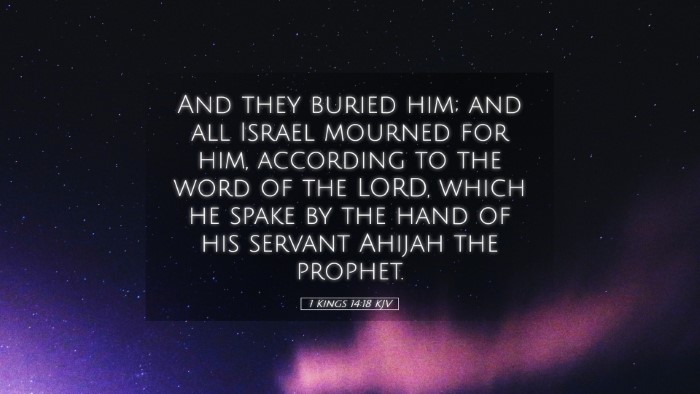Commentary on 1 Kings 14:18
Verse: "And they buried him; and all Israel mourned for him, according to the word of the Lord which he spake by the hand of his servant Ahijah the prophet."
Introduction
This verse encapsulates the fulfillment of prophecy concerning the death of Jeroboam's son, Abijah. The importance of this moment is underscored by the public mourning of Israel, which reflects the gravity of prophetic words and the consequences of sin. It serves as a pivotal teaching point for understanding God's sovereignty and the implications of His words delivered through His chosen prophets.
Contextual Analysis
Before delving into the theological implications, it is crucial to understand the context surrounding 1 Kings 14. Jeroboam, the first king of the northern kingdom of Israel, was warned by the prophet Ahijah about the consequences of idolatry and disobedience. The death of Abijah marks a significant moment that illustrates God's judgment upon Jeroboam’s household.
Public Domain Commentary Insights
-
Matthew Henry:
Henry highlights that the mourning in Israel indicates a communal recognition of the providential act of God. The death of Abijah had a dual significance: it was an act of judgment intertwined with a promise of mercy towards other descendants. Henry notes that while Jeroboam's line was being cut off, Abijah's burial carried an honor that Jeroboam himself, due to his iniquities, would never receive.
-
Albert Barnes:
Barnes emphasizes the prophetic integrity of Ahijah, underlining how this mourning and burial act fulfill the prophecy given. He posits that Abijah’s death serves as a cautionary tale about the results of turning away from God's path. Barnes illustrates the importance of recognizing God's word as authoritative and the necessity of aligning one’s life with divine instructions.
-
Adam Clarke:
Clarke offers an in-depth exploration of the social and religious implications of public mourning in Israel. He suggests that the nation's mourning is a reflection not only of Abijah’s life but of the people's own spiritual state. Clarke proposes that the collective sorrow hints at the impending judgment Israel faces due to their continual rebellion against God. This verse acts as a symbol of the inevitable fallout of a nation straying from divine ordinance.
Theological Implications
This verse carries deep theological truths regarding the nature of God’s judgment and mercy. The act of burial signifies respect and the acknowledgment of Abijah's unique place among Jeroboam's lineage, hinting at the complexity of divine justice and grace.
Judgment and Mercy
The fact that the text notes that all Israel mourned for him indicates that there was 'something good' about Abijah despite his family's sin. This juxtaposition serves as a testament to the merciful character of God, who allows for moments of grace even in judgment. The idea of God’s mercy transcending familial sin can encourage believers in their own families' struggles with faith and practice.
Prophetic Authority
Moreover, the narrative reinforces the authority and efficacy of prophetic words. Ahijah’s prophecy is fulfilled to the letter, establishing the importance of prophetic ministry. For pastors and scholars, the implications of prophetic accuracy lead to discussions on how God’s word is communicated today and how it influences our lives.
Lessons for Today
In light of 1 Kings 14:18, there are several lessons that contemporary readers can draw:
-
The Need for Faithfulness:
The failure of Jeroboam and his descendants serves as a warning for today’s church leaders and members to remain steadfast in faith and practice. Compromise can lead to generational consequences.
-
The Role of Prophecy:
This passage showcases the necessity of prophetic voices within the church today. Recognizing and responding to God’s word can lead to transformation and renewal within communities.
-
The Power of Community Mourning:
The public mourning for Abijah can teach us about the significance of shared grief and accountability within the body of Christ. Active participation in one another’s burdens is foundational to a healthy community of faith.
Conclusion
1 Kings 14:18 serves as a poignant reminder of the intertwining between prophetic words, communal values, and the character of God. As we reflect on this passage, it is vital for pastors, students, and scholars to grasp the weight of divine prophecy and the call for fidelity among God’s people. Through understanding God’s actions and the reverberations they produce, we are better equipped to engage with the complexities of faith in our own lives and communities.


